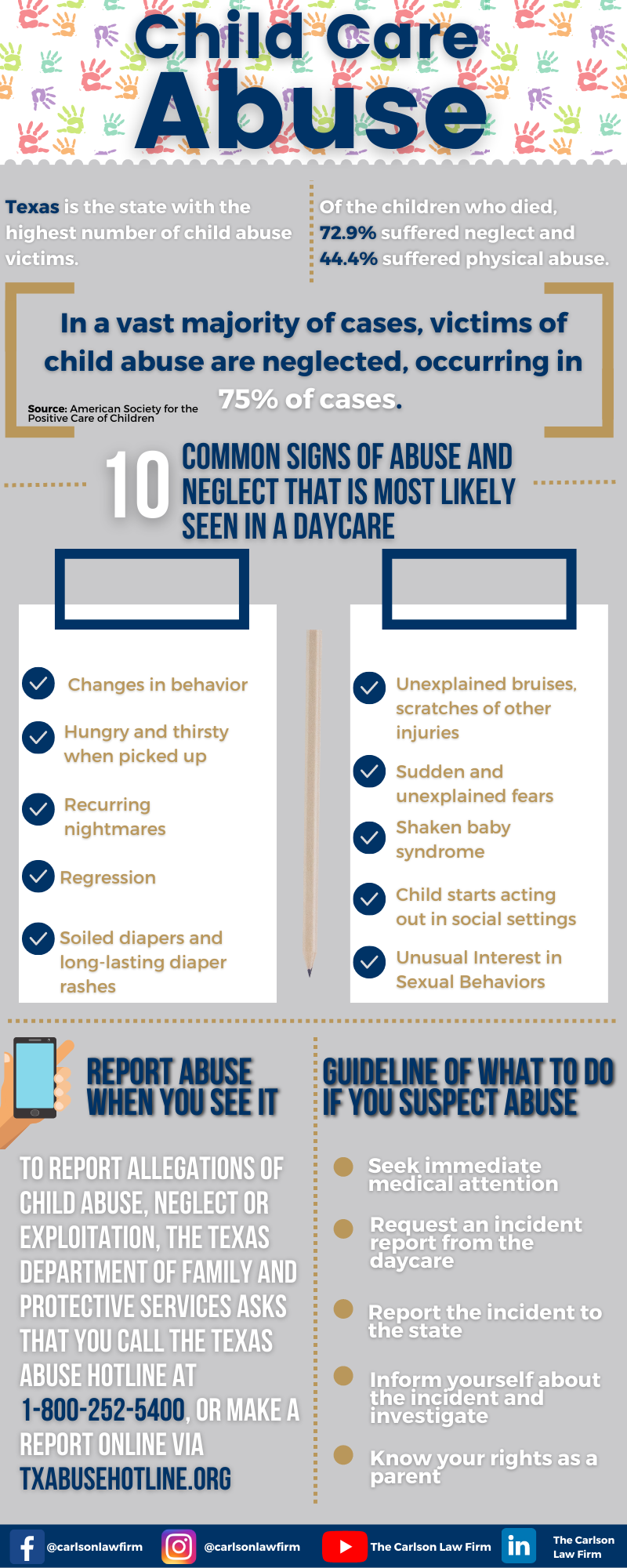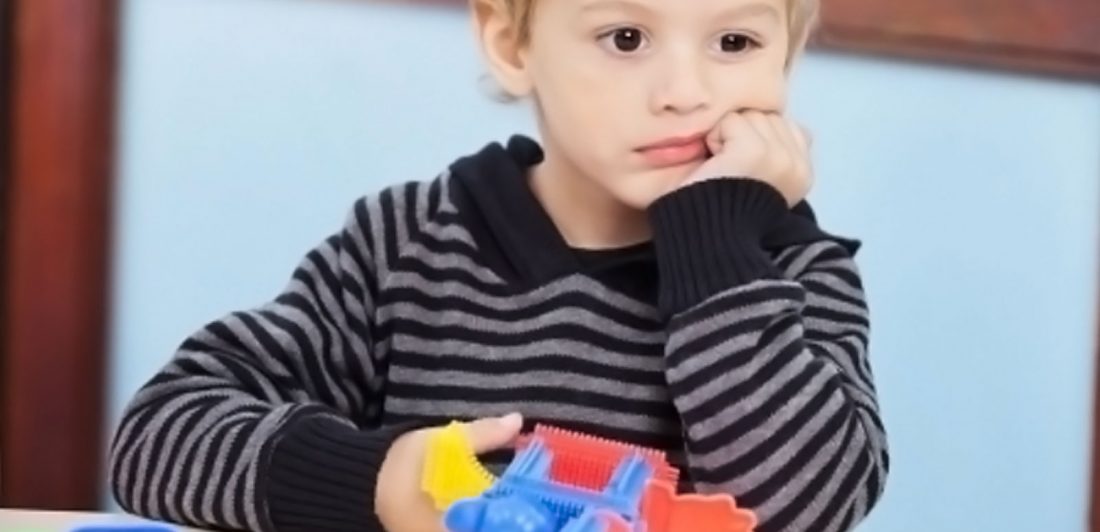Daycare workers are responsible for the care of all the children in their charge. When they fail to maintain a reasonable level of care, they are acting negligently and can be held legally liable for their actions. If your child has suffered harm at the hands of a child care employee, whether it be physical abuse, sexual abuse, verbal abuse or child neglect, we may be able to help you fight for the justice you and your children so rightly deserve. Unfortunately, the signs of daycare abuse aren't always apparent. So it is important that parents are knowledgeable about what to look out for.
What Types of Abuse Can Occur in Daycare?
Spotting the signs of daycare abuse depends on the type of abuse your child is enduring. All forms of abuse carry the possibility of inflicting extremely negative and long-lasting effects on your child. As civil law attorneys who specialize in assisting families navigate the worst moments of their lives, we have seen daycare abuse in all forms. The most common abuses include the following:
- Physical Abuse
- Sexual abuse
- Emotional Abuse
- Neglect
Each form of abuse carries its own behaviors and physical symptoms. In some cases, children may be fearful of discussing what is happening to them. By keeping an eye out for odd behavior or physical symptoms of you can know exactly how to speak with your child about the possible abuse. It is imperative that parents, grandparents or other guardians keep an open line of communication with their children.
What is deprivational abuse?
Deprivational abuse occurs when a caregiver deliberately withholds food or nourishment, forces a child into isolation or withholds love as a form of punishment. This can also be done for sadistic reasons or to induce illness. Deprivational abuse may often be confused with neglect. However, neglect is a much milder and nuanced term that implies forgetfulness or failure because of stress, competing priorities, lack of education or socioeconomic deprivation.
10 Common Signs Of Daycare Abuse and Neglect To Watch Out For
The signs of daycare abuse and neglect may not be obvious to just anyone. Daycare abuse can easily go unnoticed, which is why knowing exactly what to look for can help you to identify a problem early on before it’s too late.
1. Unexplained bruises, scratches or other injuries
Physical abuse is usually the most noticeable sign of abuse. If you drop your child off at daycare without bruises, scratches or other injuries, but pick up your child with unexplained injuries, it may indicate physical abuse. These injuries will be most apparent on the wrists, arms, buttocks, neck, shoulders or back of the legs. In addition, if your child flinches at sudden movements, a raised hand or cowers when being touched, this is a strong sign of physical abuse.
2. Changes in behavior
A child who becomes withdrawn, shy, depressed or shows signs of guilt or shame for small misdeeds may indicate daycare worker misconduct. It may be difficult to distinguish between your child's desire for independence and withdrawn behavior. However, this level of independence is not a typical attribute in very young children. Young children who are withdrawn or caught up in their own world could be hiding something. Because it is difficult for small children to keep secrets they may retreat into themselves.
Children who are enduring abuse may also become aggressive. Kicking, biting and scratching are all red flags that a child is dealing with abuse.
3. Hungry and thirsty at pick up
Negligent daycares will fail or forget to provide the children with food and drink. A child who is always hungry or thirsty at pick-up time may indicate neglect or deprivational abuse.
4. Recurring nightmares
When caregivers are tormenting a child at school, the child may have difficulty getting a full night's rest. Daycare workers may torture children by using scary masks or other terrifying acts that may have lingering traumatic effects.
5. Regression
Regressive behavior such as clinginess, bed wetting, thumb sucking, sudden fear of the dark or excessive crying may indicate that your child is experiencing serious traumatic abuse. Regression can be caused by verbal or sexual abuse.
6. Soiled diapers and long-lasting diaper rashes
Picking your child up with a soiled diaper every day should raise red flags. In addition, while diaper rashes are a common baby and toddlerhood occurrence, long-lasting rashes may indicate that your child is not getting regular diaper changes throughout the day. This is a sign of neglect.
7. Your child starts acting out in social situations
Studies show that “a child's behavior is an outward manifestation of inner stability and security.” Because of this, abuse is damaging to children in that it affects them physically, emotionally and psychologically. This can lead to long-term difficulties with a child's behavior and mental health development. An abused child may not be able to control impulses in social settings. For example, these children may be disobedient, defiant and argumentative. In other cases, the child may fail to show guilt, regret or remorse after behaving badly.
8. Unusual interest in sexual behaviors
Children who are being sexually abused may demonstrate sexual knowledge that is far beyond what they're expected to know at their age. This is because they are being exposed to this information and it is often a sexual abuser who is exposing them to this information. If your child shows advanced sexual knowledge, investigate the matter further.
Because of their innocence, children can be extremely trusting of any adult. This is particularly true for an adult in an authority position such as a teacher or aide in their daycare. In many cases, sexual abusers use fear to intimidate and extort child victims to keep them from talking to their parents or another adult about the abuses they are enduring. For example, an abuser may tell a child that if they tell anyone that they (the child) will get in trouble.
In other instances, abusers use the trust your child has for them and stresses the importance of “secrets.” Secrets between adults and children are always inappropriate. To find out about the possibility of abuse in your child's daycare, speak openly with your child about these types of situations. Ensure them that they can and must talk to you about anything without fear or retaliation.
9. Sudden and unexplained fears
Unfortunately, many parents will brush off the signs that their child is being abused at daycare as a tantrum. However, this is a major indication of abuse. An abused child may be exceptionally clingy or react in a fearful or angry manner when being dropped off at daycare. In some cases, a child may fake an illness, excessive crying or otherwise try to make excuses not to go to daycare. Do not assume this is a tantrum, ask your child questions about why they feel this way. Pay attention to how your child reacts to certain places, people, or activities; an excessive fear of going to daycare.
10. Shaken Baby Syndrome
Shaken baby syndrome (SBS) is a form of child abuse that can lead to permanent brain damage or death. The condition is entirely preventable and is typically done by a frustrated or overwhelmed caregiver. If your child is still a baby look for signs of shaken baby syndrome including:
- Glassy eyes
- Appears rigid
- Appears lethargic
- Loss of appetite
- Vomiting
- Crying frequently
- Unable to focus on an object
- Seizures
Signs of an Irresponsible Daycare Worker
It is hard to leave your child under the care of someone who you don’t personally know very well. Since appearance alone cannot discern whether a daycare worker is “good” or “bad”, it will be helpful to have an understanding on behavioral cues that may give signs of a bad caregiver.
- Your child is quiet and withdrawn around a specific person.
- Your child often states how scared they are of a particular daycare worker.
- The caregiver always has an excuse as to why things are not running as they should.
- When you visit, the daycare worker is always on the computer or smartphone.
- Your child frequently comes home with soiled clothes.
- The caregiver has a bad attitude, a short temper, or appears unhappy while at work.
How To Choose The Right Facility For Your Child
For many parents, choosing to leave their children with people who are, for the most part, strangers is already a difficult decision. However, there are many reasons that parents choose to send their children to a daycare or childcare provider. For some, it's because they have no other choice because they have to work. As a result, we often rely on word-of-mouth recommendations and daycares to adhere to rigorous federal and state regulations. However, even the most highly recommended and least cited daycares can have hidden issues.
Parents should adhere to these tips to ensure that their children are in a safe and secure learning environment.
Open door policy
Make sure that the daycare center allows parents the freedom to come and go. Avoid facilities that require parents to call first and have areas that are off-limits to parents.
Bathroom policy
Make sure that bathrooms do not contain areas where children can be isolated. Find out who takes the children to the bathroom, for what purposes, and at what times. Approximately, two-thirds of all daycare sexual abuse and exploitation occurs during toileting.
Staff training
Ask about the extent of education and training of all daycare personnel interacting with your children. In addition, ask if they were screened for criminal history, emotional instability, or substance abuse. Be aware that volunteers or teacher's aides are not likely to have been carefully screened. Abuse in daycare can result from a failure in the hiring process.
Outside visitors
Find out who will be interacting with your children in addition to the daycare provider and staff. Much of the sexual and physical abuse and exploitation associated with childcare centers occur at the hands of individuals not directly involved in teaching or child-care responsibilities. Typically, this includes bus drivers, janitors, and relatives of the daycare center providers. Further, in 36% of cases examined by a nationwide study of daycare abuse, children were sexually molested by family members related to the staff—mainly husbands or sons. Finally, make sure that caregivers limit your child's contact with such persons. And don't be afraid to question your child closely about them.
Discipline policy
Discuss in-depth with the daycare provider how the discipline of children is handled — who administers it, under what circumstances it is used, and what form it takes. Make sure to talk to your children each day about what happens at the daycare center, paying close attention to what punishments were used under what circumstances and any other incidents that made the child uncomfortable.
What The Carlson Law Firm Can Do To Help
Given that about 40% of children under five spend at least part of their week in the care of somebody other than a parent, is important for parents to be aware of the signs of daycare abuse. The facilities we trust our children to, such as daycares, after-school programs and camps, aren’t providing the quality of care they are required to, and children are being hurt because of this negligence.
If you believe your child is being harmed at his or her daycare center, after-school program, camp or any other child care facility, please don’t hesitate to contact our team of experienced daycare abuse attorneys at The Carlson Law Firm. We are available to speak with you 24 hours a day, 7 days a week. We care, we can help.
Files from daycareabuse.com, familyeducation.com




